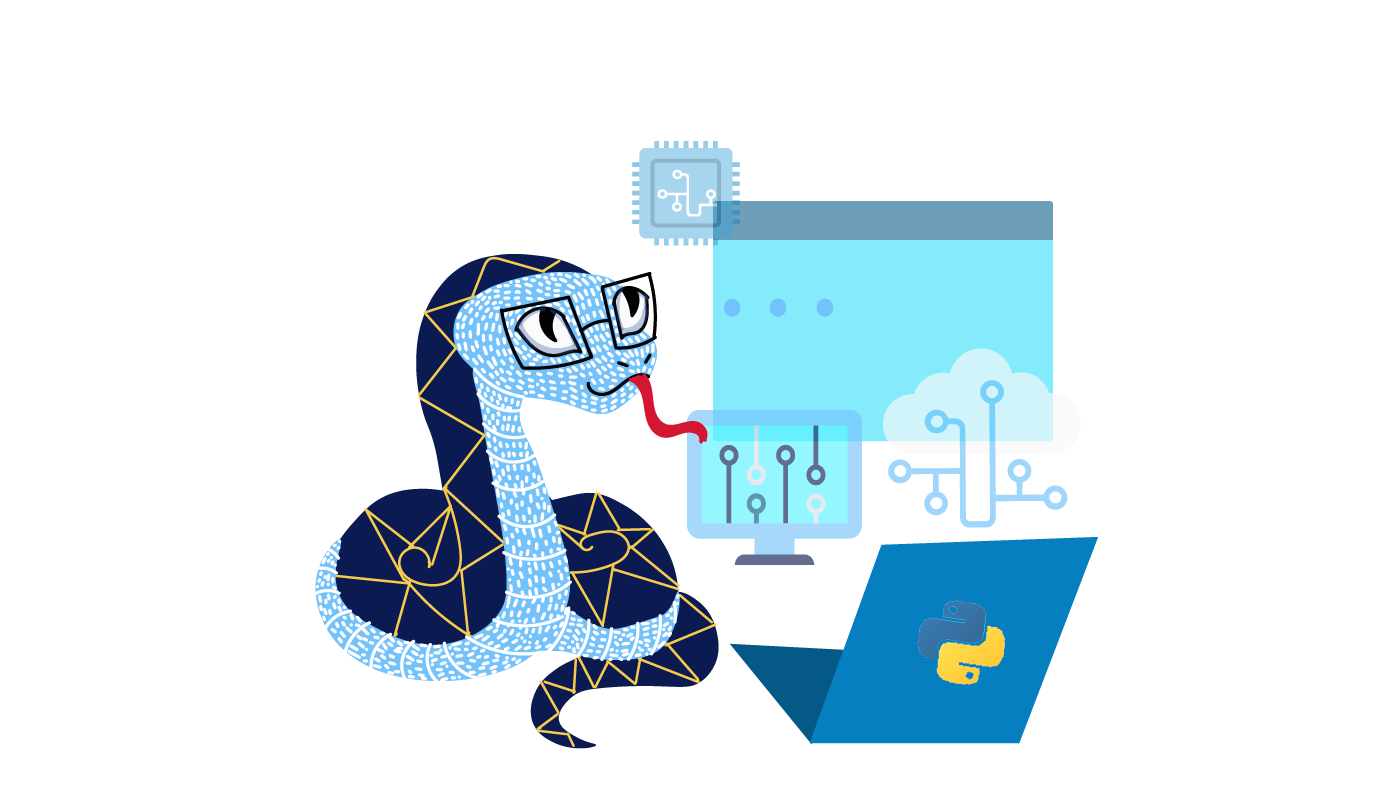What is the first thing that comes to your mind when you think of developing your own software? Well, usually, it’s your mission, success, or needed effort and resources. Negative thoughts usually lag behind, but once you get to know the overly competitive AI market, you’ll need to decide how to create a product that will stand apart from your competitors.
Ever wondered what plays a crucial role in making a project successful? Well, it’s the technologies you choose to use! The platforms and tools you select have a big impact on how data gets processed and how different elements work together.
Picking the right programming language for your project can be a bit difficult. There are over 1300 programming languages, and each language has its strengths and specific uses. Right now, let’s take a closer look at two major players in this field – C# and Python.
The main difference between Python and C# is their design and intended applications. Python stands out for its simplicity and adaptability, thus it’s favored for tasks like data science, machine learning, and quick prototyping. In contrast, C# is built for creating reliable, high-performing applications. It’s perfect for enterprise software, gaming, and cross-platform projects.
In this article, we’ll discuss the differences between C# and Python in detail to help you determine which one might be a better fit for your needs.
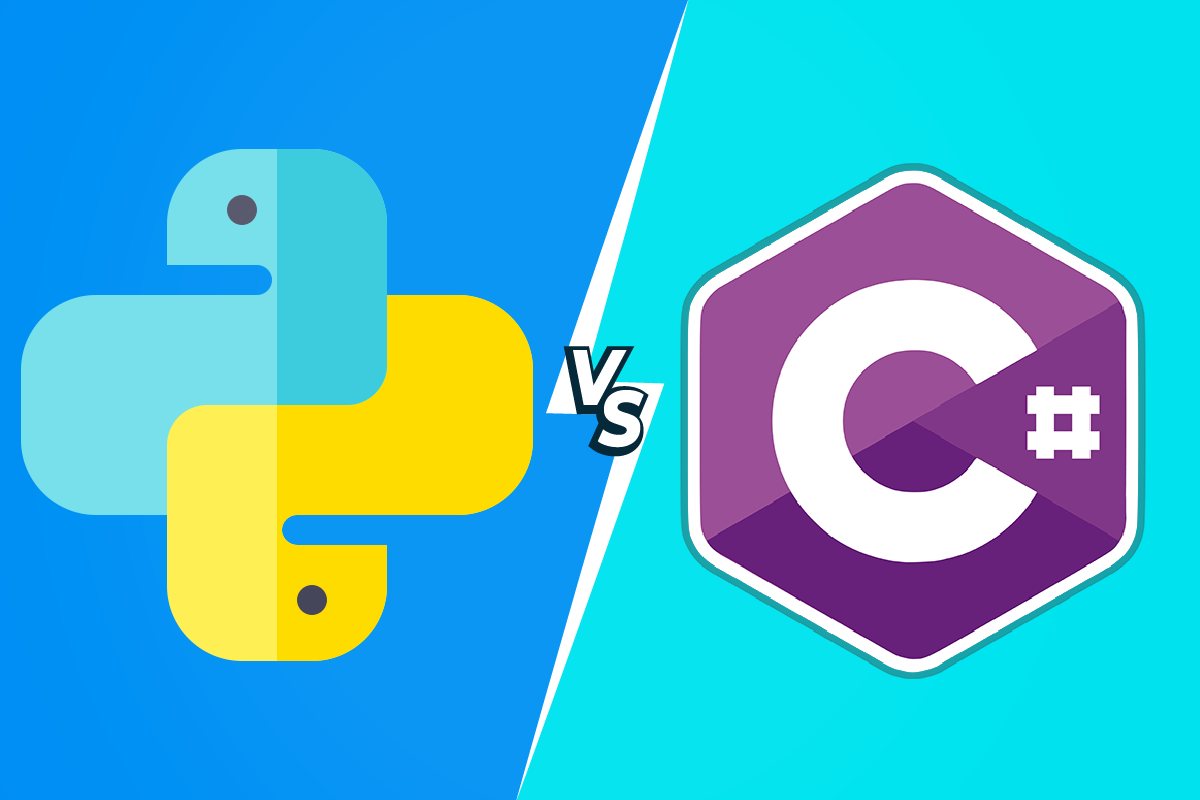
What’s C# Language?
At its core, C# is an object-oriented, general-purpose, and type-safe programming language. As a cradle for C#, Microsoft is fully responsible for its development and features, both nice and not that nice. Being similar to Java syntactically, this programming language is easy to learn, especially for those who know Java, C, and C++. No surprise, over 13 million developers worldwide opt for C#.
One of the differences between C# and Python is that with the help of C#, programmers can build various robust, durable, and secure applications that run in .Net. This framework allows the creation of multi-platform applications, which is highly helpful since it saves development time if you need to run apps on different platforms.
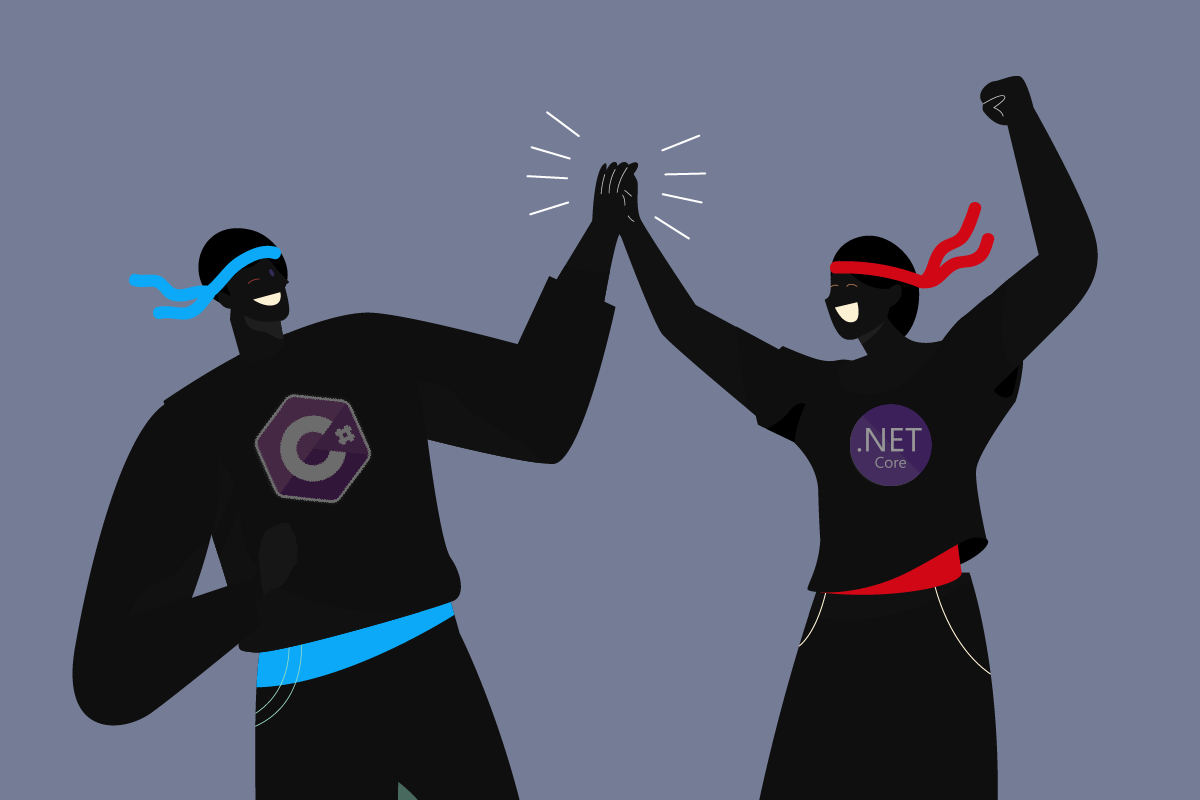
We’ve mentioned that C# language helps create robust apps. You may wonder how. First things first, the .Net garbage collector automatically allocates and releases the memory of an app. With nullable types guard, there is also a minimal risk that your code makes the runtime throw System.NullReferenceException, which typically reflects developer error. Besides, since C# has exception handling, it ensures effective error detection and recovery.
This programming language provides Language Integrated Query (LINQ) syntax, a set of technologies that allow the creation of a common pattern for working with data from any source. It helps build distributed systems. By choosing C# programming language for creating your app, you’ll ensure it’ll be type-safe and have increased performance. If you’re looking for top-notch C# software development services, LITSLINK is always happy to help!
Why C# Programming Language?
There are many reasons why C# is in demand. The main reasons are mentioned below:
Efficient & Powerful
When choosing between Python vs C#, efficiency plays an important role. Since C# belongs to the C family of languages, it makes writing efficient code easier, thus improving runtime performance. Moreover, this programming language is constantly improved with new features and has lots of available resources to level up developer experience.
Object-oriented Programming Language
C# is an object-oriented language, and because of this, maintenance, development, and debugging become easier. Among other advantages over procedural programming are a clear structure for the programs and full reusability of apps with less code and shorter time.
It`s Cross-platform
Thanks to .Net Core, C# is a fully cross-platform programming language. .Net Core is free and is compatible with all major operating systems such as Windows, Mac OS, and Linux.
Open-source
The C# language is growing fast because it’s open-source. There are many open and active communities, which encourage language improvement. Myriads of open-source projects and tools are available on GitHub.
Type-safe
While developing your app with C#, you can’t perform unsafe casts. Its compiler checks whether a developer uses the right types (a set of possible values). If not, it’ll not pass compilation. Besides, by writing such a safe code, you should not worry about data loss during the process of conversion.
Simple to Compose
Due to the rich library, many functions are easy to implement with C# programming language. C# has code with a strict nature, meaning apps created with the language are consistent.
What is C# Used For?
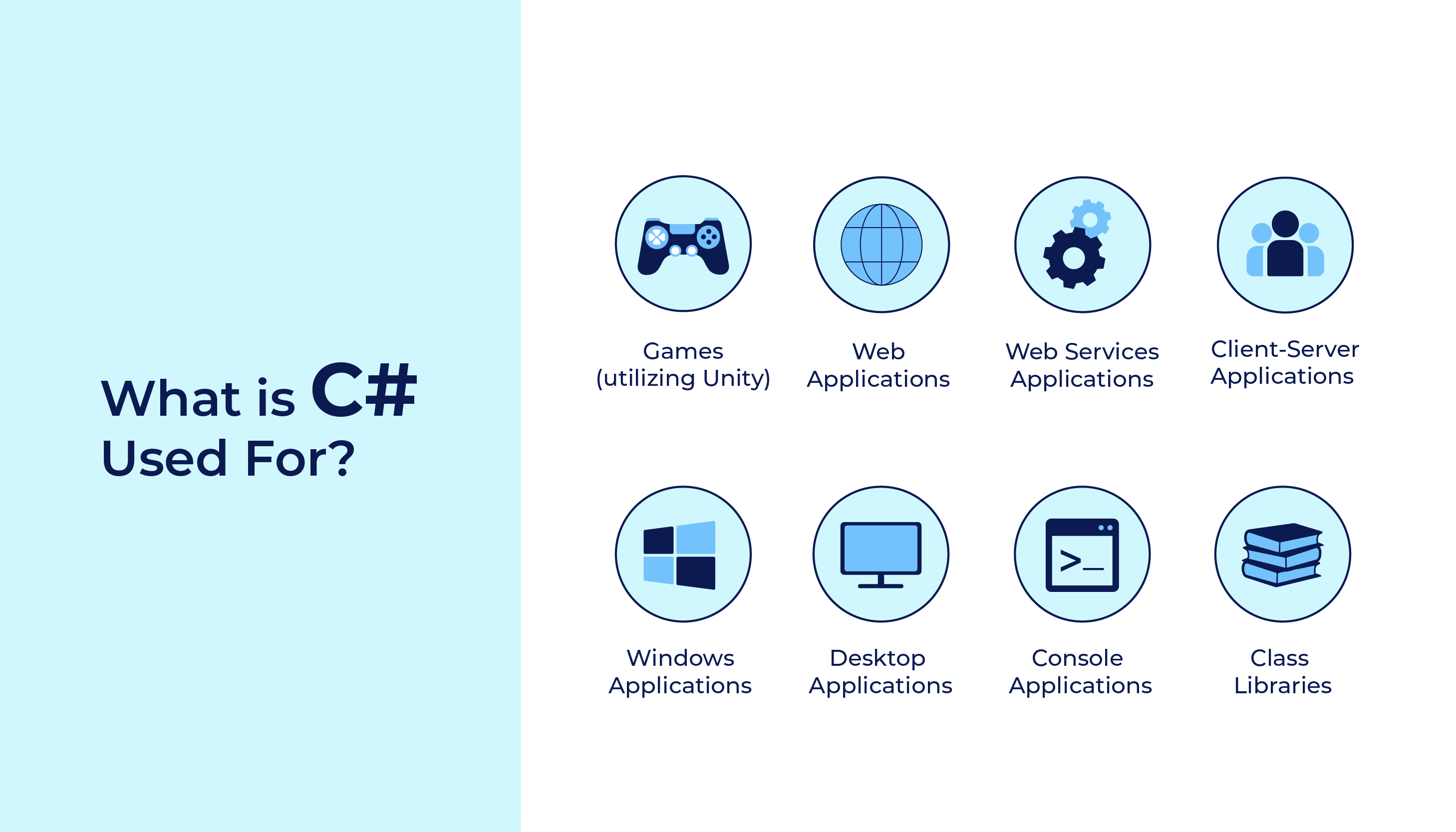
The main areas are:
- Web applications: C# is a popular choice for developing web applications using the ASP.NET framework. ASP.NET is a powerful platform that provides a wide range of features for building web applications, including web forms, MVC, and Web API. Some popular websites built with C# include Stack Overflow, LinkedIn, and Tripadvisor. In any case, you can choose between C# or Python.
- Desktop applications: C# can also be used to develop desktop applications using the Windows Forms or WPF frameworks. Windows Forms is a mature framework that provides a wide range of controls for building user interfaces. WPF is a newer framework that provides a more modern and declarative way to build user interfaces. Some popular desktop applications built with C# include Visual Studio, Microsoft Office, and Adobe Photoshop.
- Mobile applications: C# can be used to develop mobile applications for both iOS and Android using the Xamarin platform. Xamarin allows developers to write C# code that can be shared across both platforms, which can significantly reduce development time and cost. Some popular mobile applications built with Xamarin include Pinterest, Uber, and Starbucks.
- Games: C# is a popular choice for developing games using the Unity game engine. Unity is a powerful game engine that allows developers to create high-quality 2D and 3D games for a variety of platforms, including PC, Mac, mobile, and consoles. Some popular games built with Unity include Cuphead and Hearthstone.
Enterprise applications: C# is also widely used for developing enterprise applications, such as CRM, ERP, and SCM systems. C# is a good choice for developing enterprise applications because it is a scalable, reliable, and secure language. Some popular enterprise applications built with C# include Salesforce, SAP, and Oracle.
What is Python Language?
Currently, Python is one of the most popular programming languages in the world. Indeed, it ranked the #1 programming language, in the November 2024 TIOBE Index. But what kind of player is this in the market? Python is known as a dynamic, object-oriented, and high-level programming language. Programmers often fall in love with Python due to its ability to boost productivity. Its dynamic typing and dynamic binding make the language attractive for Rapid Application Development. Besides, Python is simple and has easy-to-learn syntax. It enhances the language’s readability, thus cutting down the cost of program maintenance.
Python modules and packages allow such software design techniques as program modularity and reusing code. The language’s extensive library is freely available for all the principal platforms, meaning there are no access barriers.
Both C# and Python are fast, but there is no compilation step in building an app with Python. That’s why it’s speed to accomplish the edit-test-debug cycle. When you debug your app, the risk that it’ll cause a segmentation error is negligible.

Moreover, since Python is a general-purpose programming language and isn’t specialized for any specific issues, it can be used to build all sorts of programs. Indeed, its beginner-friendliness and broad applicability have made it the most popular programming language. Hire our dedicated Python developers, and they’ll prove to you how effective this language can be!
Interesting fact: If you ever wonder where the name Python comes from, it’s not just a genus of a snake. Guido van Rossum, who created the language, took it from the BBC’s Monty Python’s Flying Circus, thinking this name is short and mysterious.
Why Python?
Easy to Learn
Python is usually recommended to beginners as a nice start because this language is easy to learn, read, and write. Compared to C/C++ and Java, to perform the same task, you need fewer lines of code. It has a simple English-like syntax that makes coding more intuitive. Thus, it is clear why Python usage has grown by 27% annually in recent years.
High Productive
Due to the comparative simplicity of Python, developers spend less time building software. There is no need to immerse yourself in trying to understand the syntax or how the programming language can behave. With less code, surprisingly, you get more things done.
Dynamically Typed
You don’t have to declare the variable type while assigning a value to it in Python. This is a big difference between Python and C# because other languages, like from C family, have a strict declaration of variables, while Python doesn’t even know the type of variable until you run the code. So, Python is dynamically typed, which cuts down the time and effort spent on developing software.
Free and Open-source
Since Python has an OSI-approved open-source license, you can freely use and distribute the language. If you download a source code, you can modify it and share your version of Python. Thanks to its open source, Python has frameworks that are especially convenient for web development.
Libraries Support
Python’s vast library provides all the functions you may need for your task. No need to look for them in external libraries, which may not be free. Libraries’ support allows you to build software that is limited only by your imagination.
Portability
With Python, there is no need to write different codes for different platforms. You write it once and run the program virtually anywhere. It immensely saves developing time.
What is Python Used For?
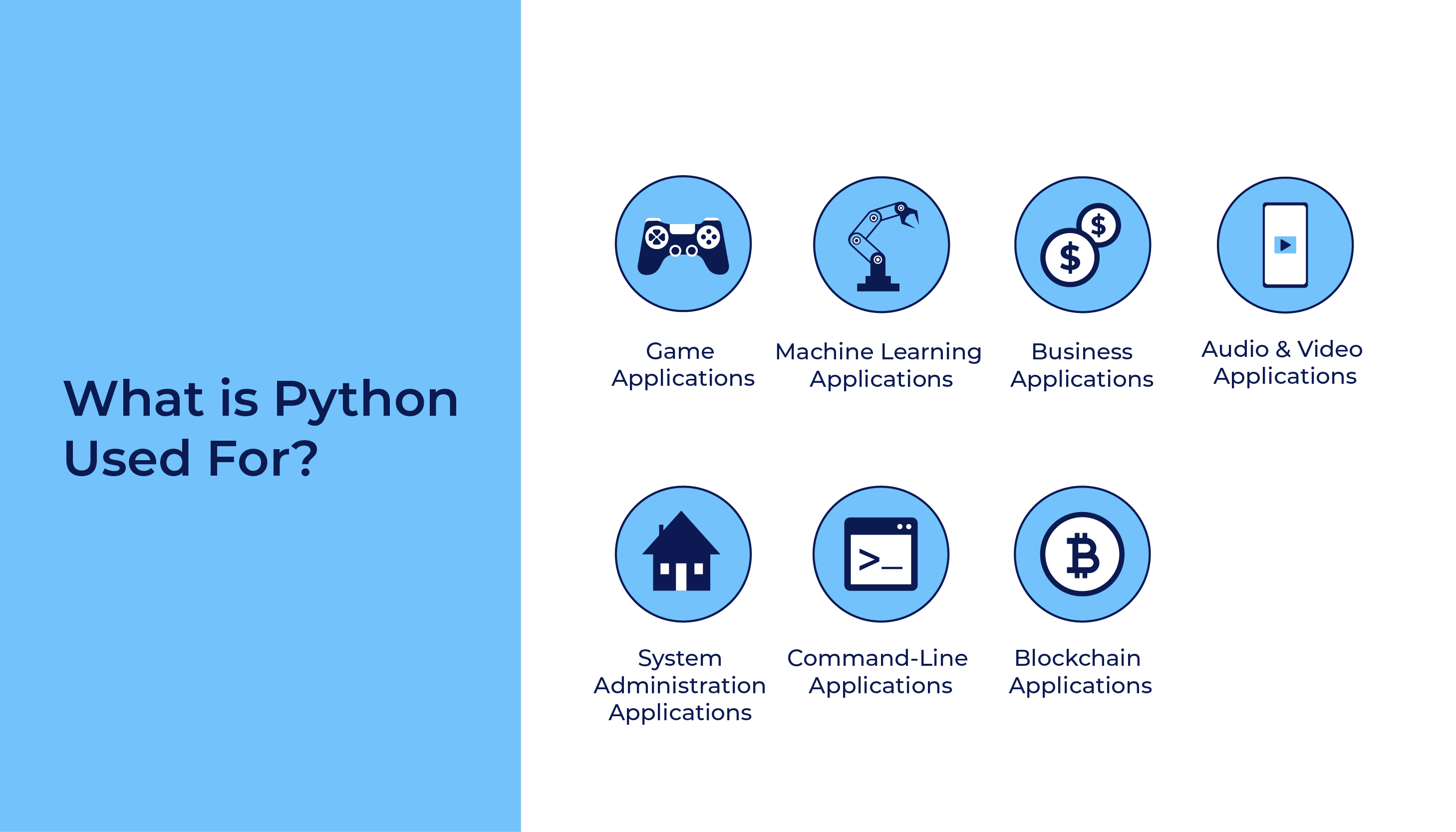
Here are the most common areas:
- AI & Machine Learning: PyTorch and Keras provide different ways to create, train, and use AI models. NLTK, spaCy, and Gensim help you understand and generate human language, handling tasks like sentiment analysis, chatbots, and machine translation. Python and C# are popular in the creation of modern software, but in the field of AI Python has no equal.
- Scientific Computing & Engineering: Beyond NumPy and Pandas, SciPy has advanced math functions. Matplotlib and Seaborn make eye-catching visualizations for scientific data. SimPy and AnyLogic let you create complex simulations for various scientific and engineering areas.
- Cybersecurity & Network Programming: Tools like Scapy and BeEF help test network security and exploit vulnerabilities. Scrapy aids in web security assessments. Libraries such as Nmap and Scapy assist in analyzing network traffic, monitoring behavior, and detecting potential security threats.
- System Administration & DevOps: Python is a go-to for automating tasks, managing infrastructure, and deploying applications, making it popular in DevOps. Ansible and SaltStack use Python to automate server setup and manage infrastructure in large deployments. Libraries like boto3 and Google Cloud Client Library allow you to work with cloud platforms and APIs for efficient infrastructure management.
- Web and mobile development: Python proves to be a dependable and efficient choice for crafting applications intended for a global user base. Delve into our case study for a deeper insight into this domain and explore its workings
Tools, Libraries, and Frameworks for C# and Python
C# and Python each provide a robust selection of tools, libraries, and frameworks, offering versatility across various projects. Below, you’ll find a list of key tools and frameworks for each language. These options can help you decide which one best suits your project.
C# Tools, Libraries, and Frameworks
C# works seamlessly within the Microsoft ecosystem. Therefore, it’s a strong candidate for enterprise software development, gaming applications, and cross-platform solutions. Below, find essential tools and frameworks for C# developers:
-
.NET Framework/Core: For a C# developer, these serve as basic frameworks required to create web applications, APIs, desktop apps, etc. Furthermore, .NET Core enables cross-platform development.
-
ASP.NET: A web application framework for building dynamic web applications and services. Its performance and scalability make it an ideal fit for enterprise solutions.
-
Unity: Developers often choose Unity for its user-friendly interface, especially when creating immersive gaming experiences like RPGs or virtual simulations.
-
Xamarin: A consistent framework used to design native mobile applications using C# for Android and iOS devices.
-
ReSharper: A Visual Studio productivity tool for code quality, code refactoring, and code navigation.
-
NuGet: A package manager for C# that provides a vast library of reusable code to accelerate development.
Python Tools, Libraries, and Frameworks
Why use Python for AI development? Quality and excellence are the main advantages of using this programming language. Numerous libraries and frameworks available support any purpose from web to AI development. Some of the worthy instruments are as follows:
-
Django: A great web framework aimed at facilitating rapid secure scalable application development.
-
Flask: A lightweight web framework that provides developers with greater flexibility in building web applications.
-
TensorFlow and PyTorch: Leading frameworks for machine learning and deep learning, ideal for AI and data science projects.
-
Pandas and NumPy: Essential libraries for data manipulation, analysis, and scientific computing.
-
Jupyter Notebook: An interactive environment for data visualization, exploration, and sharing.
-
Pip and Conda: Python’s package managers for managing dependencies and environments with ease.
Comparing Ecosystems
-
Breadth and Depth: When it comes to the bigger picture, AI, machine learning, and data science have a larger library pool in Python. On the other hand, C# tends to do better when it comes to having solid tools for corporate apps, gaming, and native mobile platforms.
-
Ease of Use: Python’s libraries prioritize ease of use, which is ideal for beginners and researchers. In contrast, C# tools, are mostly Microsoft-platform-oriented, which makes it quite easier for enterprise-rich developers.
-
Community and Support: For both languages, there are large communities where people can get help and also get updates on the ecosystems.
By understanding the tools, libraries, and frameworks available for C# and Python, you can align your choice with the specific needs of your project. Whether you’re building data-driven AI models or crafting enterprise-grade applications, each language offers an array of resources to help you succeed.
C# vs Python: A Comparative Analysis
|
Aspect |
Python |
C# |
|
Syntax |
Simple, intuitive, and beginner-friendly. |
Structured and verbose, suitable for developers with some experience. |
|
Performance |
Interpreted, slower execution; suitable for most applications but less ideal for speed-critical tasks. |
Compiled, offers high performance; excellent for gaming and enterprise applications. |
|
Application Areas |
Data science, AI, machine learning, web development, and scripting. |
Enterprise software, game development, and cross-platform mobile apps. |
|
Platform Dependency |
Cross-platform by design (Windows, macOS, Linux). |
Cross-platform via .NET Core but tightly integrated with the Microsoft ecosystem. |
|
Type System |
Dynamically typed, allowing flexibility but prone to runtime errors. |
Statically typed, enforcing type safety at compile time and reducing runtime issues. |
|
Libraries/Frameworks |
TensorFlow, Pandas, Django, Flask, PyTorch, Jupyter Notebook. |
.NET, ASP.NET, Unity, Xamarin, NuGet. |
|
Development Speed |
Rapid prototyping with extensive library support. |
More robust but slower development due to complex syntax and structure. |
|
Community |
Diverse, global community with extensive third-party support. |
Strong, focused community, especially in enterprise and gaming sectors. |
Which One Should You Choose: C# or Python?
Python or C#? Choosing between them depends on your project requirements, your team’s expertise, and your long-term goals. Each language has its strengths, and the right choice will align with the unique needs of your project. Here’s a breakdown to help you decide:
Why Python Might Be the Right Fit
-
Speedy Development and Prototyping
If your project requires quick iteration or you’re working on something experimental, Python’s straightforward syntax and extensive library support make it a strong candidate. It’s particularly useful for startups or research-focused initiatives. -
Your Focus Is on AI, Data Science, or Machine Learning
Python dominates these fields with its robust frameworks like TensorFlow, PyTorch, and Pandas, providing everything needed for cutting-edge AI and data analysis. -
Cross-Platform Compatibility Is a Priority
Python runs seamlessly across operating systems, making it a great choice for projects that require platform independence. -
Perfect for Beginners or Rapid Learning
Python’s syntax is clean and easy to pick up, even for those new to programming. For teams just starting out or looking to minimize setup complexity, Python is an approachable and effective option.
When C# Shines
-
Prioritizing Performance and Scalability
C# stands out for its speed and efficiency, which makes it ideal for large-scale enterprise applications or performance-heavy tasks like gaming. Its compiled nature ensures reliable execution and scalability. -
You’re Developing Enterprise Applications
With its strong integration into the Microsoft ecosystem and frameworks like ASP.NET, C# excels in building scalable, robust enterprise solutions. -
You’re Creating Games or Interactive Media
C# is the go-to language for game development, thanks to its integration with Unity, one of the world’s most popular game engines. -
Native Mobile App Development
For teams building mobile apps that require native performance on both iOS and Android, C# offers Xamarin, a framework tailored for this purpose.
General Considerations
-
Team Expertise: If your team has experience in one language, leveraging their existing knowledge can speed up development and reduce learning curves.
-
Project Timeline: Python’s simplicity makes it better suited for projects on tight deadlines. However, if your project requires long-term maintainability, C# may offer a more structured foundation.
-
Budget: Python’s ecosystem is open-source-heavy, while C# tools may involve licensing costs when working within the Microsoft environment.
By evaluating these factors, you can choose the language that best supports your goals and maximizes your project’s success.
Wrapping Up
Choosing between C# and Python is a tricky task. They are both great in some aspects but also have their downsides. But anyway, we can use only one language while building software.
In short, C# and Python are both high-level, object-oriented, and easy-to-learn languages. They ensure fast development and good performance. However, C# is more clear and organized, and it’s much faster at runtime. In contrast, Python is easier to learn and write than C# and has vast standard libraries.
Both C# and Python are excellent programming languages. Thus, picking one over the other is more a matter of preference than the risk of choosing the wrong language for the project. At LITSLINK, we use a wide range of technologies and choose the best stack for each project.



